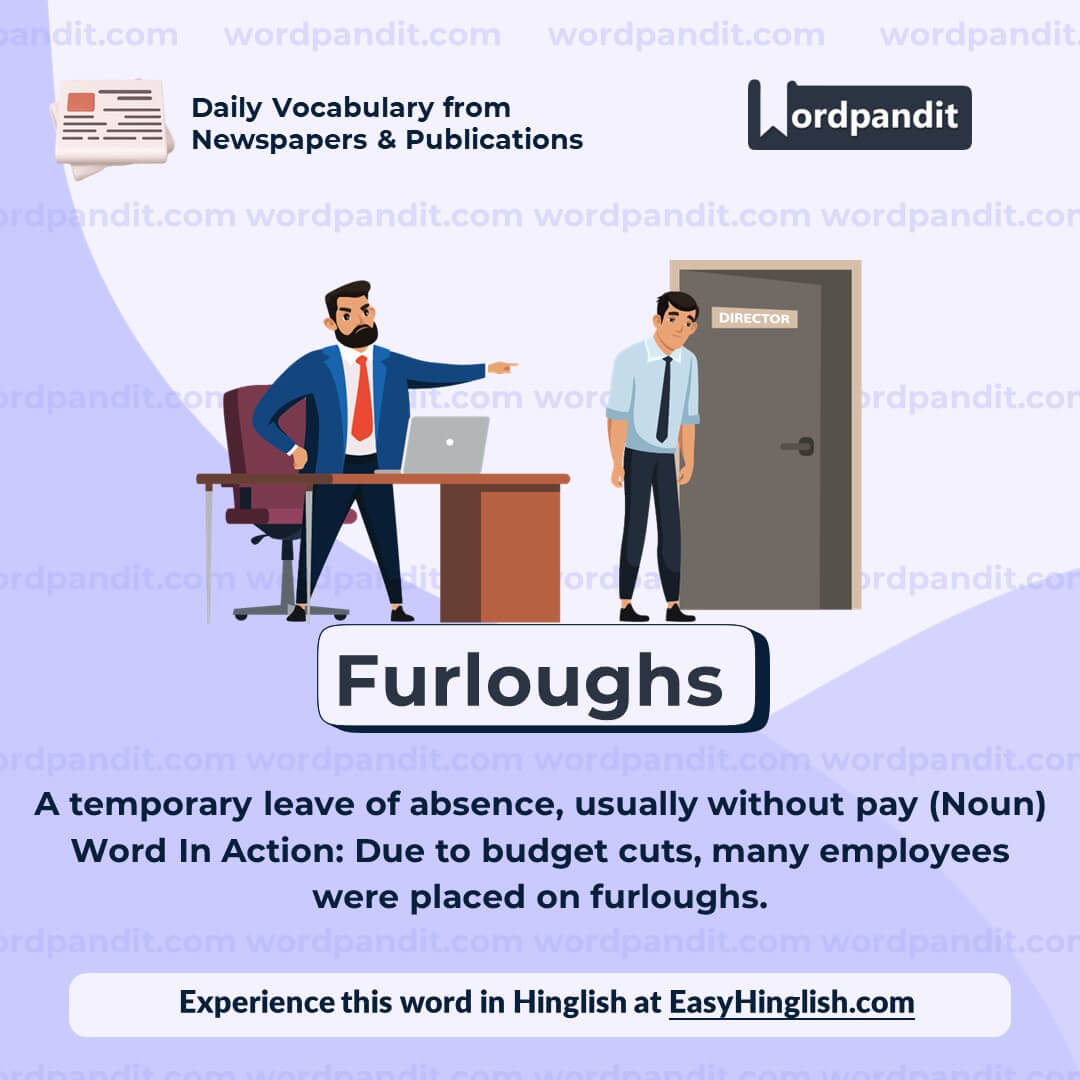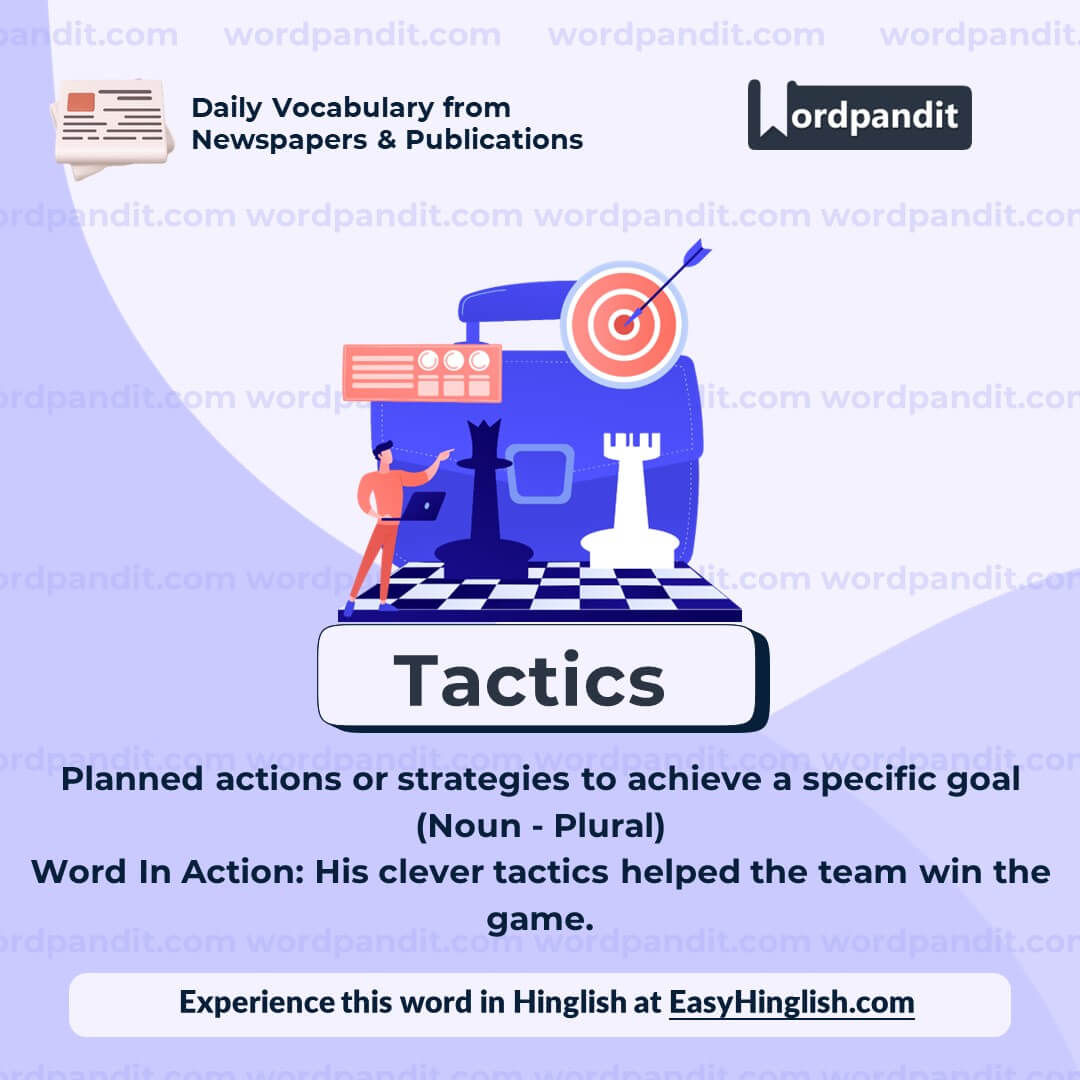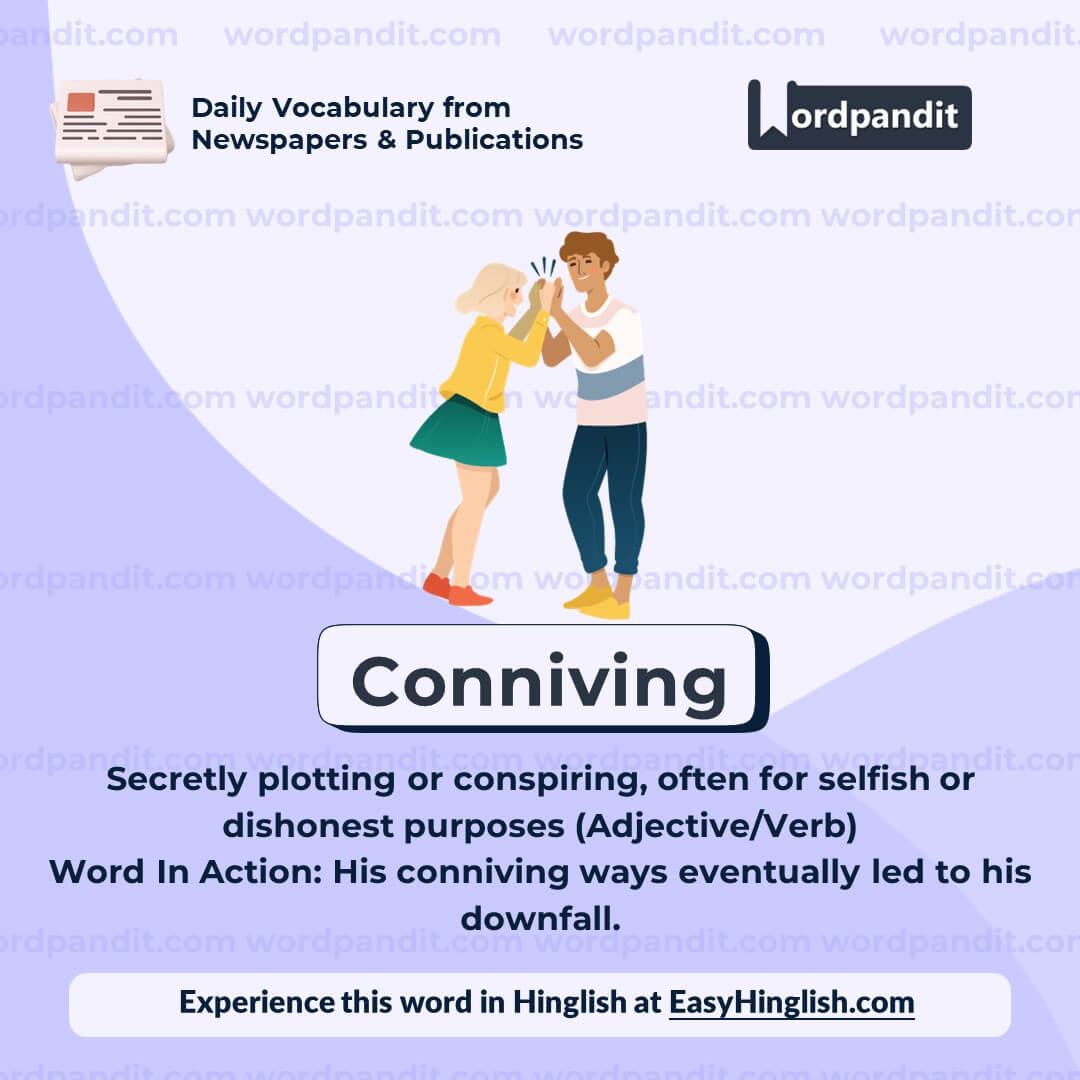Daily Vocabulary from Indian Newspapers and Publications
Welcome to Wordpandit’s Indian Vocabulary Hub
At Wordpandit, we understand the importance of staying rooted in the local context while expanding your language skills. This section focuses on enriching your vocabulary with words and phrases drawn from India’s leading newspapers and publications, ensuring you're learning vocabulary that is practical, relevant, and uniquely Indian.
Why Indian Sources Matter
We believe that the best way to master any language is by immersing yourself in local content. That’s why we carefully curate vocabulary from top Indian publications, including:
- The Hindu
- The Times of India
- The Economic Times
- Hindustan Times
- Live Mint
- The Indian Express
- And many others...
Stay Updated, Stay Relevant
With daily updates from Indian news sources, you’ll be consistently learning words that reflect the trends and shifts in Indian society and culture. Our focus is to provide vocabulary that enhances your understanding of the language in an Indian context.
How Wordpandit Supports Your Goals
Whether you’re preparing for exams, aiming to improve your professional communication, or simply want to stay connected with the latest Indian vocabulary, Wordpandit is here to guide you every step of the way.
Learn with a Practical Approach
Our interactive learning methodology includes real-world examples, engaging activities, and context-specific usage to ensure that every word becomes part of your active vocabulary.
Dive into Indian Vocabulary Today!
Why Choose Wordpandit?
Practical Learning: Focus on words you'll actually encounter in real-world reading, enhancing your comprehension and communication skills.
Diverse Content: From current affairs to scientific breakthroughs, our varied sources expose you to vocabulary across multiple domains.
Effortless Integration: Make Wordpandit a part of your daily routine. Just a few minutes each day can significantly boost your lexicon over time.
Your Path to Vocabulary Mastery
- Visit our Daily Vocabulary section regularly
- Explore new words and their usage in context
- Practice incorporating these words into your own writing and speech
- Track your progress as your vocabulary expands
Start Your Journey Today
Embark on your vocabulary enhancement journey with Wordpandit. By consistently engaging with our daily posts, you'll build a robust vocabulary that serves you well in academic, professional, and personal contexts.
Remember, a word a day keeps linguistic limitations at bay. Make Wordpandit your daily companion in the quest for vocabulary excellence!
WORD-1: Radiant
Context:
"Her striking amber eyes and radiant smile earned her the nickname 'Mona Lisa', drawing widespread attention online." - Telegraph India
Explanatory Paragraph:
The word "radiant" describes something or someone that emits brightness, warmth, or joy. It can refer to physical light, like the sun, or metaphorical brightness, such as a glowing personality. When someone has a "radiant smile," it means their happiness and warmth are visibly expressed in their expression.
Meaning: Shining brightly; expressing happiness or positivity (Adjective)
Pronunciation: RAY-dee-uhnt
Difficulty Level: ⭐⭐ (Easy)
Etymology: From Latin "radiantem," meaning "beaming or shining," derived from "radiare," meaning "to shine."
Synonyms & Antonyms:
Synonyms: Glowing, beaming, luminous, dazzling, brilliant
Antonyms: Dull, dim, gloomy, lackluster, shadowy
Usage Examples:
- She looked absolutely radiant in her wedding dress, glowing with happiness.
- The morning sun cast a radiant glow over the misty hills.
- His radiant personality made everyone around him feel cheerful and uplifted.
- As she stepped onto the stage, her confidence was radiant, captivating the entire audience.
Cultural Reference:
"Radiant" is often used in literature and media to describe beauty and positivity. In the famous novel *Charlotte’s Web* by E.B. White, the word "radiant" is one of the words used to describe Wilbur the pig, signifying his special and lovable nature.
Think About It:
What qualities or actions make a person truly "radiant" beyond just their physical appearance?
Quick Activity:
Write a short paragraph describing a scene using the word "radiant" to capture the mood or atmosphere.
Memory Tip:
Think of the sun, which radiates light and warmth. Just like the sun, a "radiant" person shines brightly with happiness or energy.
Real-World Application:
The word "radiant" is commonly used in fashion, photography, and beauty industries to describe a glowing, healthy, or joyful appearance. It is also used in everyday conversations to compliment someone’s happiness or charm.
WORD-2: Furloughs
Context:
"Four days later, Peter Marocco — a returning political appointee from Trump’s first term — drafted a tougher than expected interpretation of that order, a move that shut down thousands of programs around the world and forced furloughs and layoffs." - New Indian Express
Explanatory Paragraph:
"Furlough" refers to a temporary leave of absence, often without pay, granted to an employee due to financial or operational reasons. Unlike layoffs, furloughed employees are still technically employed and may return to work once the situation improves. Furloughs are common in government agencies, businesses, and military settings during economic downturns or budget cuts.
Meaning: A temporary leave of absence, usually without pay (Noun)
Pronunciation: FUR-loh
Difficulty Level: ⭐⭐⭐ (Intermediate)
Etymology: Derived from the Dutch word "verlof," meaning "leave" or "permission," and later adopted into English in the 17th century.
Synonyms & Antonyms:
Synonyms: Leave, sabbatical, suspension, layoff, unpaid leave
Antonyms: Employment, reinstatement, hiring, retention
Usage Examples:
- Due to budget constraints, the company announced temporary furloughs for several employees.
- Government workers faced prolonged furloughs during the financial crisis.
- After the pandemic hit, many airline staff were placed on furlough until travel resumed.
- Despite the furlough, she remained hopeful about returning to work soon.
Cultural Reference:
During the 2019 U.S. government shutdown, thousands of federal employees were placed on furlough without pay, sparking nationwide debates on job security and economic stability.
Think About It:
How do furloughs impact employees’ financial and mental well-being compared to permanent layoffs?
Quick Activity:
Write a short paragraph explaining how furloughs affect businesses and employees differently from layoffs.
Memory Tip:
Think of "furlough" as a "forced low" period—a temporary dip in employment rather than a permanent job loss.
Real-World Application:
Furloughs are widely used during economic crises, company restructuring, or government shutdowns. Understanding this term is essential for employees and business leaders to navigate uncertain job markets.
WORD-3: Tactics
Context:
"When Congress refused, the Trump administration used freezes and other tactics to cut the flow of funds already appropriated by Congress for the foreign programs." - New Indian Express
Explanatory Paragraph:
The word "tactics" refers to specific strategies or methods used to achieve a goal, especially in politics, business, sports, or warfare. Tactics are often short-term actions designed to handle a particular situation or challenge. In the given context, the Trump administration employed various tactics to withhold funds despite Congressional approval.
Meaning: Planned actions or strategies to achieve a specific goal (Noun - Plural)
Pronunciation: TAK-tiks
Difficulty Level: ⭐⭐ (Easy)
Etymology: From the Greek word "taktikos," meaning "arranged" or "ordered," which later evolved in Latin as "tactica."
Synonyms & Antonyms:
Synonyms: Strategy, plan, maneuver, approach, method
Antonyms: Randomness, disorder, inaction, spontaneity
Usage Examples:
- The company used aggressive marketing tactics to attract new customers.
- Chess masters rely on complex tactics to outmaneuver their opponents.
- His negotiation tactics helped secure a better deal for the business.
- The general devised new military tactics to counter the enemy’s attack.
Cultural Reference:
The famous military treatise *The Art of War* by Sun Tzu emphasizes the importance of tactics in warfare, stating that "all warfare is based on deception."
Think About It:
How do tactics differ from long-term strategies, and why are both important in decision-making?
Quick Activity:
List three different situations where tactics are used in daily life and explain their effectiveness.
Memory Tip:
Think of "tactics" as "tact-ics"—the smart and calculated moves made in any competition or challenge.
Real-World Application:
Understanding tactics is crucial in areas such as business, politics, sports, and even personal decision-making, where planned actions lead to successful outcomes.
WORD-4: Confidante
Context:
"In the case of Sharma, it had emerged that he was the architect’s confidante in the tapes and paid a heavy price for the friendship." - The Wire
Explanatory Paragraph:
The word "confidante" refers to a trusted person with whom one shares personal matters, secrets, or feelings. It is often used to describe close friends, advisors, or companions who offer support and discretion. In the given context, Sharma was someone the architect trusted deeply, which eventually led to consequences for him.
Meaning: A trusted person with whom one shares private matters (Noun)
Pronunciation: KON-fi-dant
Difficulty Level: ⭐⭐⭐ (Intermediate)
Etymology: Derived from the French word "confidant," meaning "trusted person," which itself comes from the Latin "confidere," meaning "to trust."
Synonyms & Antonyms:
Synonyms: Trusted friend, companion, advisor, ally, counselor
Antonyms: Stranger, enemy, betrayer, rival
Usage Examples:
- She considered her grandmother her closest confidante, sharing all her secrets with her.
- The politician’s longtime confidante advised him on critical decisions.
- Over the years, they became more than just colleagues—they were each other’s confidantes.
- He realized too late that his supposed confidante had betrayed his trust.
Cultural Reference:
In literature, a confidante character often plays a crucial role in helping the protagonist navigate challenges. For example, in *Pride and Prejudice*, Elizabeth Bennet's sister Jane serves as her confidante, listening to her concerns and offering support.
Think About It:
What qualities make a person a great confidante, and why is trust so essential in such relationships?
Quick Activity:
Write about a moment when having a confidante helped you in a difficult situation.
Memory Tip:
Think of "confidante" as someone you can "confide in"—a person who keeps your secrets safe.
Real-World Application:
Having a confidante is important in personal and professional life, as strong relationships built on trust can provide emotional support and valuable guidance.
WORD-5: Conniving
Context:
"But,” he said, “the major disappointment is with the civil servants who are conniving in this with the powers that be.” - The Wire
Explanatory Paragraph:
The word "conniving" describes secretive or deceitful behavior, often involving collaboration in dishonest or unethical schemes. When someone is conniving, they are scheming behind the scenes, usually for personal gain or to manipulate others. In the given context, the civil servants are being accused of secretly assisting or conspiring with those in power for dubious reasons.
Meaning: Secretly plotting or conspiring, often for selfish or dishonest purposes (Adjective/Verb)
Pronunciation: kuh-NY-ving
Difficulty Level: ⭐⭐⭐ (Intermediate)
Etymology: From the Latin word "connivere," meaning "to wink" or "to turn a blind eye," later evolving in French as "conniver" with a sense of secret scheming.
Synonyms & Antonyms:
Synonyms: Scheming, plotting, conspiring, deceitful, manipulative
Antonyms: Honest, transparent, straightforward, ethical
Usage Examples:
- The conniving politician secretly worked with lobbyists to manipulate policies in his favor.
- She saw through her coworker’s conniving attempts to take credit for her work.
- The villains in the movie were a group of conniving criminals planning a heist.
- His conniving nature made it difficult to trust anything he said.
Cultural Reference:
The character of Littlefinger in *Game of Thrones* is a prime example of a conniving individual, always plotting behind the scenes for power and influence.
Think About It:
Why do some people resort to conniving behavior in professional or political environments, and what are the consequences?
Quick Activity:
Write a short dialogue between two characters—one is conniving, and the other is trying to expose their schemes.
Memory Tip:
Think of "conniving" as "con-spiring"—working in secret with others for personal gain.
Real-World Application:
Understanding conniving behavior is useful in workplaces, politics, and personal relationships, as it helps identify manipulative tactics and protect oneself from being deceived.



















